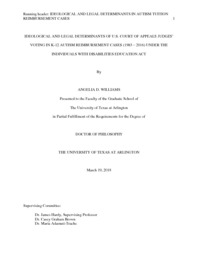
ATTENTION: The works hosted here are being migrated to a new repository that will consolidate resources, improve discoverability, and better show UTA's research impact on the global community. We will update authors as the migration progresses. Please see MavMatrix for more information.
Show simple item record
| dc.contributor.advisor | Hardy, James C. | |
| dc.creator | Williams, Angelia Dalene | |
| dc.date.accessioned | 2023-09-11T13:34:36Z | |
| dc.date.available | 2023-09-11T13:34:36Z | |
| dc.date.created | 2018-05 | |
| dc.date.submitted | May 2018 | |
| dc.identifier.uri | http://hdl.handle.net/10106/31639 | |
| dc.description.abstract | The results of this study reveal the influence of (1) U.S. Court of Appeals judges' political ideology; (2) pivotal special education Supreme Court Decisions' influence; and (3) Individuals with Disabilities Education Act (IDEA) of 1997 Amendments' influence on appellate judges' voting decisions impacting K-12 education autism tuition reimbursements between 1983 and 2016, using descriptive and inferential analyses with binary logistic regression as a statistical tool. Principal inquiries are: 1. Does U.S. Court of Appeals judges' political ideology (as measured by party of the appointing president or DW-NOMINATE Measure scores) influence their voting in whether to award tuition reimbursement under the IDEA in cases involving students with autism?
2. Are there differences in the power of party of the appointing president (Republican or Democrat) and DW-NOMINATE Measure scores (political conservatism or liberalism) in predicting whether court of appeals judges' award tuition reimbursement in IDEA cases involving students with autism?
3. What influences do legal developments in IDEA 1997 Amendments exert on Court of Appeals judges' voting in IDEA tuition reimbursement cases involving students with autism?
The principal findings for this investigation are: (1) ideology, as determined by party of appointing president is an effective means to predict judges' voting in K-12 autism tuition reimbursement cases decided by U.S. Court of Appeals. The odds of a Democrat-appointed appellate judge voting in favor of K-12 tuition reimbursement for students with autism is significantly greater than a Republican-appointed appellate judge. (2) Judicial ideology, as determined by judges' DW-NOMINATE Measure score is an effective predictor of judges' voting in K-12 tuition reimbursement for students with autism; the odds of a pro-parent vote by a Democratic-appointed appellate judge is significantly greater than a Republican-appointed appellate judge. (3) Whether a tuition reimbursement for students with autism in the K-12 setting occurred before or after IDEA 1997 Amendments is an effective predictor of appellate judges' voting in favor of the plaintiff, whether measured within a model utilizing party of the appointing president or DW-NOMINATE Measure scores as an ideological predictor. The odds are significantly greater for a U.S. Appeals Court judge to vote in favor of tuition reimbursement after the IDEA 1997 Amendments. | |
| dc.format.mimetype | application/pdf | |
| dc.language.iso | en_US | |
| dc.subject | autism | |
| dc.subject | tuition reimbursement | |
| dc.subject | Individuals with Disabilities Education Act (IDEA) | |
| dc.subject | judicial ideology | |
| dc.subject | logistic regression | |
| dc.title | Ideological and Legal Determinants of U.S. Court of Appeals Judges' Voting in K-12 Autism Reimbursement Cases (1983 - 2016) Under the Individuals With Disabilities Education Act | |
| dc.type | Thesis | |
| dc.date.updated | 2023-09-11T13:34:36Z | |
| thesis.degree.department | Educational Leadership and Policy Studies | |
| thesis.degree.grantor | The University of Texas at Arlington | |
| thesis.degree.level | Doctoral | |
| thesis.degree.name | Doctor of Philosophy in Educational Leadership and Policy Studies | |
| dc.type.material | text | |
Files in this item
- Name:
- WILLIAMS-DISSERTATION-2018.pdf
- Size:
- 762.4Kb
- Format:
- PDF
This item appears in the following Collection(s)
Show simple item record


